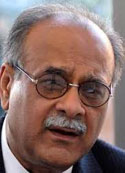Trading With the 'Enemy'?

By Najam Sethi
06 Feb 2015
A recent conference in Delhi deliberated on the issues bedevilling trade relations between India and Pakistan. Currently, Pakistan’s yearly exports to India are a mere $0.6bn and India’s to Pakistan are about $2bn. Guesstimates of illegal trade via third countries like the UAE are in the range of about $2bn. Everyone agreed that a target of $10bn is easily achievable if Pakistan gives MFN status to India – a win-win situation for both countries that have long been prisoners of the zero-sum philosophy in which the gain of one is the loss of the other and therefore unacceptable to the “loser”. Why hasn’t this happened so far?
For a long time, Pakistan’s position was that the “core” Kashmir issue should be resolved and trust built mutually before normal trade relations could be restored. But the 1999 Lahore summit between Prime Ministers Nawaz Sharif and Vajpayee resolved to stop putting “core” preconditions to conflict resolution and start a composite dialogue to address all outstanding issues simultaneously.
Unfortunately, Kargil derailed Lahore, and in Agra 2001 India listed terrorism as its “core” issue in opposition to Pakistan’s “core” issue of Kashmir. Consequently, the composite dialogue in general, and trade in particular, was again taken off the table. The brave efforts of General Pervez Musharraf, first with Mr Vajpayee and then with Dr Manmohan Singh, to make amends via back-channel diplomacy and out-of-the-box thinking on Kashmir were overtaken by General Musharraf’s ouster in Pakistan and the terrorist attack on Mumbai in 2008.
Matters were frozen until Nawaz Sharif returned to power in 2013 and decided to de-link trade from politics and propose a wide ranging Non-Discriminatory Access (MFN) regime which India has long demanded as the starting point of conflict resolution (it’s win-win for both countries but India wins more than Pakistan because it is expected to run up a significant trade surplus with liberalisation). An agreement was painstakingly hammered and Dr Manmohan Singh was expected to crown his term by signing it in Islamabad before India went into elections in 2014. At the last minute, however, Pakistan decided to wait for a new government to be elected in India and sign the trade accord with it as a grand first step toward “normalisation”. It was in that spirit that Nawaz Sharif attended Narendra Modi’s inauguration in Delhi after the BJP won the elections, even though he was cautioned at home to tone down his expectations of peace with an avowed anti-Muslim hardliner like Mr Modi.
In the event, despite the bonhomie displayed by both leaders at the inauguration ceremony, Mr Modi has pulled back and jeopardised the entire exercise, thereby embarrassing Nawaz Sharif hugely. Both sides are back to trading accusations instead of goods and services. Whether or not they get back on track soon depends solely on Mr Modi.
Meanwhile, the subject of the role of the media on both sides as a warmonger or peacemaker is again up for discussion. Questions abound about the media acting as a “force-multiplier” for the negatively attuned “security establishments” of both countries, and electronic ratings driving passions with pride and prejudice. Is the media part of the problem or part of the solution?
It has been more negative than positive in the past. The Pakistani media stopped Benazir Bhutto from signing a cultural accord with Rajiv Gandhi in 1989 and the Indian media stopped Mr Gandhi from signing an agreement on Siachin in 1991. The Indian media again stopped IK Gujral from starting a composite dialogue in 1997 and both hyped the nuclear explosions in 1998. But in 1999, both hyped “bus diplomacy” and welcomed the composite dialogue accord between Nawaz Sharif and AB Vajpayee. Both again derailed the Agra talks in 2001 between General Musharraf and Mr Vajpayee, compelling significant back-channel diplomacy until the terrorist attack in Mumbai put paid to any thought of peace. The last attempt at putting the composite dialogue back on track, at Sharm al Sheikh in Egypt between PM Yousaf Raza Gilani and Dr Manmohan Singh, was waylaid by the Indian media which accused Dr Singh of “conceding” to Pakistan without any significant action against the perpetrators of the Mumbai attack. What conclusions can we draw from this potted recap of history?
First, if Nawaz Sharif and Narendra Modi decide to trade with each other, the media in both countries will likely be a force-multiplier (as in 1999) aiding their initiatives because there can be no better people-to-people trust building exercise than one which creates powerful business vested interests for normalization in both countries at the behest of traditionally hard-line political parties. It should not be forgotten that the media in India is largely corporate owned and the same trend is now visible in Pakistan. Second, if this opportunity is missed, both sides will inevitably slide into hostile public posturing and no leader will be able to muster the courage to start talking, let alone trading, with the “enemy” for a long time to come.
Source: http://www.thefridaytimes.com/tft/trading-with-the-enemy/

No comments:
Post a Comment